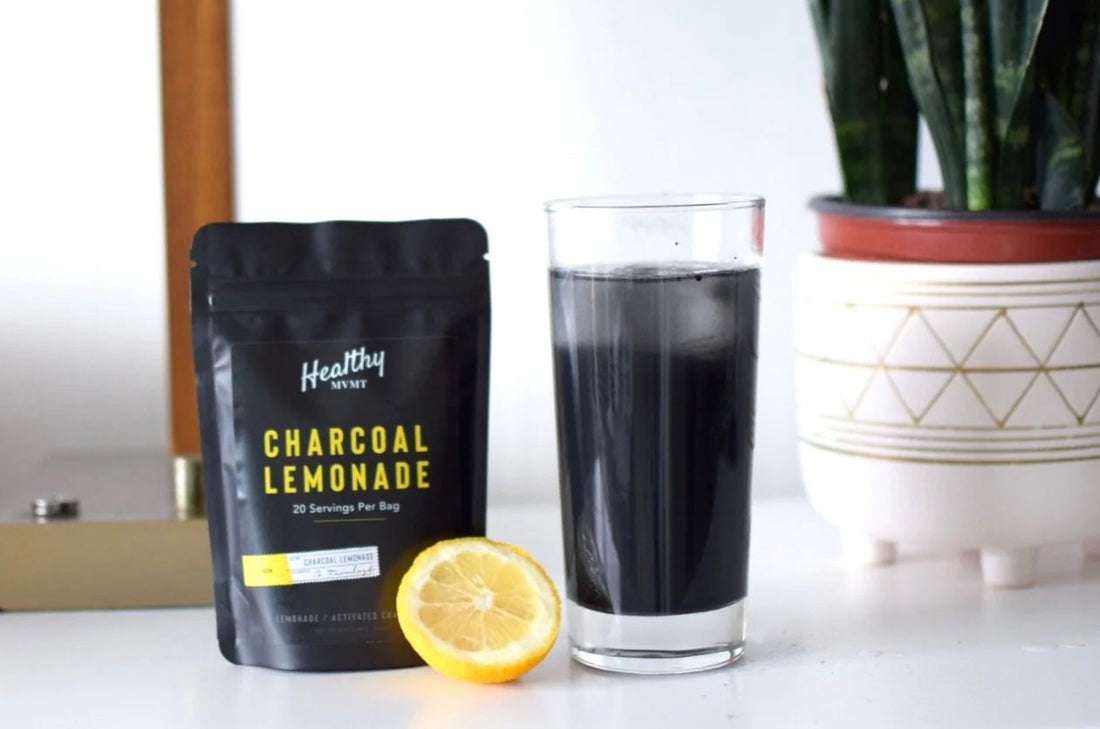Interested in innovative ways to detoxify your body and boost well-being? One such trend that has gained significant attention is charcoal activated lemonade. This unique beverage combines the zesty goodness of lemons with the detoxifying properties of activated charcoal. In this article, we will delve into the world of charcoal activated lemonade, exploring its benefits, how to make it at home, and addressing some common questions surrounding this intriguing drink.
Understanding Charcoal Activated Lemonade
Charcoal activated lemonade is not your typical lemonade. It incorporates activated charcoal, a finely powdered, odorless, and tasteless substance made from carbon-rich materials like wood, coconut shells, or peat. Activated charcoal is known for its ability to trap toxins and chemicals in the body, making it a popular choice for detoxification.
The use of charcoal for medicinal purposes dates back to ancient civilizations. Egyptians, for instance, utilized it to address intestinal ailments. Similarly, ancient Hindus and Chinese civilizations employed charcoal to filter water and treat various health issues.
The Greeks, including the renowned physician Hippocrates, recognized the adsorbent properties of charcoal. They used it to treat a variety of ailments, from digestive disorders to poisoning. Romans, too, appreciated its value in treating indigestion.
Why Lemonade?
To put it simply, it tastes good! You are more likely to consume a healthy product if you like it. By adding lemonade to activated charcoal, you get the healthy benefits plus a delicious taste.
The Benefits of Charcoal Activated Lemonade
Detoxification
The primary reason people turn to charcoal activated lemonade is its detoxifying properties. Activated charcoal binds to toxins, preventing their absorption by the body and aiding in their elimination.
Improved Digestion
Lemonade itself is known to support digestion, and when combined with activated charcoal, it can help alleviate bloating and indigestion.
Here's how activated charcoal alleviates bloating and digestion issues:
Adsorption of Gas and Toxins: The primary mechanism by which activated charcoal is believed to help with bloating is through adsorption. Activated charcoal has a porous structure that allows it to trap or bind to gas molecules and toxins in the digestive tract. This binding process is not absorption, where substances are taken into the body, but adsorption, where they adhere to the surface of the charcoal particles.
Reducing Gas Buildup: Bloating often occurs when excess gas accumulates in the digestive system. This can happen due to various factors, including the fermentation of undigested food by gut bacteria. Activated charcoal may help reduce this gas buildup by binding to some of the gas molecules, potentially providing relief from bloating.
Aiding in Detoxification: Some proponents of activated charcoal suggest that its detoxifying properties can indirectly benefit digestion. By adsorbing toxins in the gastrointestinal tract, it may help the body rid itself of harmful substances that could contribute to digestive discomfort.
Relieving Indigestion: Activated charcoal may also have a soothing effect on indigestion, particularly when it is related to excess gas. By reducing gas pressure in the stomach and intestines, it could alleviate the discomfort associated with indigestion.
Teeth Whitening
Some enthusiasts claim that charcoal activated lemonade can help whiten teeth. However, this benefit is anecdotal and requires further research. Here's how activated charcoal is believed to work for teeth whitening:
Adsorption of Stains: Activated charcoal has a porous structure with a large surface area. It is thought to adsorb (not absorb) stains and particles on the surface of teeth. Adsorption refers to the binding of molecules or particles to the surface of another substance. In this case, activated charcoal is believed to bind to stains on the enamel of the teeth.
Surface Abrasion: Some proponents of charcoal toothpaste suggest that the fine particles of activated charcoal can also act as a gentle abrasive, helping to physically scrub away surface stains. This mild abrasive action is thought to contribute to the whitening effect.
Binding to Toxins and Impurities: Activated charcoal is known for its ability to adsorb toxins and impurities in various contexts. Some proponents claim that it can help remove impurities and toxins from the mouth, contributing to a fresher and cleaner oral environment.
Hangover Relief
The detoxifying effects of activated charcoal have led some to use charcoal activated lemonade as a hangover remedy.
Here's how activated charcoal lemonade is believed to aid in hangover relief:
Adsorption of Toxins: One of the primary reasons people turn to activated charcoal for hangover relief is its ability to absorb toxins. When you consume alcohol, your body metabolizes it into various compounds, including acetaldehyde, which is toxic. The theory is that activated charcoal can bind to these toxins and prevent their absorption in the digestive tract, potentially reducing the severity of hangover symptoms.
Reducing Alcohol Absorption: Activated charcoal is thought to slow down the absorption of alcohol in the stomach and small intestine. By doing so, it may help to mitigate the rapid spike in blood alcohol levels that can contribute to hangover symptoms.
Alleviating Indigestion: Hangovers are often accompanied by stomach discomfort and indigestion. Lemonade, with its acidic nature, can sometimes help settle the stomach. The combination of lemonade and activated charcoal may provide relief from these digestive discomforts.
Rehydration: Alcohol consumption can lead to dehydration, which is a significant factor in hangover symptoms. Lemonade, as a hydrating beverage, can assist in replenishing lost fluids and electrolytes, potentially reducing headache and fatigue.
There are several considerations and precautions if considering activated charcoal lemonade for hangover relief:
Timing: If you choose to try activated charcoal for hangover relief, it's most effective when taken shortly after alcohol consumption. Taking it the morning after a night of drinking may have limited benefits.
Individual Variation: Hangover symptoms can vary widely among individuals, and what works for one person may not work for another. The effectiveness of activated charcoal may depend on factors like the type and amount of alcohol consumed, individual metabolism, and overall health.
Safe Dosage: It's crucial to use activated charcoal at a safe dosage and not exceed the recommended amount. Excessive consumption of activated charcoal can lead to constipation and interfere with nutrient absorption.
Quality and Source: Ensure you are using food-grade activated charcoal from a reputable source to avoid potential contaminants or impurities.
Consultation with a Healthcare Professional: If you have a history of alcohol-related issues or underlying health conditions, it's advisable to consult with a healthcare professional for guidance on managing hangover symptoms.
Making Charcoal Activated Lemonade at Home
Creating your own charcoal activated lemonade is a straightforward process. Here's a simple recipe to get you started:
Ingredients:
- 2-3 lemons
- 1 teaspoon of activated charcoal
- 2 tablespoons of honey or maple syrup
- 1 liter of water
- Ice cubes (optional)
Instructions:
- Squeeze the juice from the lemons and strain out any seeds.
- In a pitcher, combine the lemon juice, activated charcoal, honey or maple syrup, and water.
- Stir until all ingredients are well mixed.
- If desired, add ice cubes to chill the lemonade.
- Serve and enjoy your homemade charcoal activated lemonade.
Is Charcoal Activated Lemonade Safe?
While charcoal activated lemonade has gained popularity, it's essential to use it in moderation. Activated charcoal can interfere with the absorption of medications and nutrients, so it's best to consult a healthcare professional before incorporating it into your daily routine. Additionally, ensure you purchase food-grade activated charcoal from reputable sources.
Conclusion
Charcoal activated lemonade offers a refreshing twist on a classic beverage while potentially providing detoxification benefits. However, it's crucial to approach this trend with caution, seeking advice from a healthcare professional before making it a regular part of your diet. As with any health trend, moderation is key.
FAQs
1. Can I use any type of activated charcoal for making charcoal activated lemonade?
It's recommended to use food-grade activated charcoal, which is specifically processed for consumption. Avoid using charcoal intended for other purposes, such as grilling.
2. How often can I consume charcoal activated lemonade for detoxification?
While some people incorporate it into their daily routine, it's best to consult a healthcare professional to determine the frequency that suits your individual needs.
3. Does charcoal activated lemonade have a noticeable taste?
Activated charcoal is tasteless, but it gives your drink a black color. However, the lemonade will make it taste like…..Lemonade!
4. Can I use lime instead of lemon to make this beverage?
Yes, you can substitute lime for lemon to create a variation of charcoal activated limeade with similar benefits.
5. Are there any side effects associated with consuming charcoal activated lemonade?
Some individuals may experience constipation or black stools when consuming activated charcoal. If you encounter any adverse effects, discontinue use and consult a healthcare professional.
Charcoal activated lemonade is a unique and refreshing way to boost your well-being. Whether you're looking to detoxify or simply enjoy a tasty beverage with a twist, give it a try, but always remember to prioritize your health and consult with a healthcare professional when in doubt.
Where Can I Buy Activated Charcoal Lemonade?
HealthyMVMT has Activated Charcoal Lemonade in-stock ready to ship to your door!

